ECOCIDE
Rubymar Sinks in Red Sea 13 Days After Houthi Attack Damaged Bulker
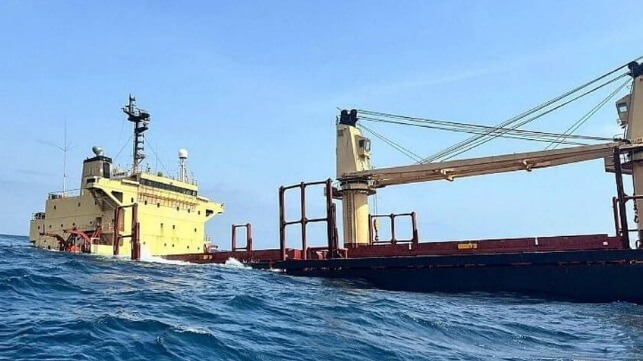
The bulker several damaged in a Houthi attack and abandoned by its crew finally succumbed to its damage reportedly sinking after having drifted since the February 18 attack. The government of Yemen issued a statement reporting the sinking of the Rubymar followed by an update to its previous reports from the UK Maritime Trade Operations.
The attack was reported to have taken place in the range of 15 to 25 nautical miles from the Yemeni port of Al-Mukha. The UKMTO in its statement confirmed the vessel had been dragging anchor. Previous analysis reported by Sky News calculated the vessel had drifted approximately 37 nautical miles north in the Red Sea.
The Yemeni government statement said the vessel was lost as the weather deteriorated on March 1. Previously it was said the vessel was continuing to take on water and images released on Yemeni TV earlier in the week clearly showed that it was continuing to settle at the stern. The BBC had published pictures a few days earlier showing the stern still above the water. Efforts to salvage the vessel and tow it to a port possibly in Djibouti or Saudi Arabia were hampered by the security situation in the Red Sea.
The government statement reported the bulker Rubymar registered in Belize was lost in a position about 11 miles from the nearest point of land in Yemen. It is unclear if any crew or authorities were at the ship when it was lost. The crew was evacuated immediately after the attack and taken to Djibouti where reports said they were flown home.
“The Yemeni government holds the Houthi militia responsible for the environmental disaster, and the repercussions of its continued targeting of shipping,” the government said. They reiterated that the Rubymar was carrying 41,000 tons of fertilizer as well as oils and fuel. The U.S. Central Command a week ago highlighted an 18-mile oil slick formed behind the damaged ship.
The statement from the spokesperson from the Yemen government highlighted the danger coming from the phosphate and other dangerous chemicals saying it was likely an algae plum would form which could result in the death of the coral, kill marine animals, and possibly damage desalination plants in the region. They referred to the “recklessness and indifference to the catastrophic repercussions,” using the loss of the Rubymar to call for further international action against the militants.
The loss of the Rubymar would be the most significant casualty since the Houthi attacks began in November days after they seized the car carrier Galaxy Leader. UKMTO calculates a total of 55 commercial ships have been targeted by the Houthi. While they were also successful in causing a significant fire on the Marlin Luanda in late January, and multiple strikes on vessels, the 32,200 dwt Rubymar (564 feet/172 meters in length) would be the first vessel to sink. Reports have alternately linked it to UK ownership although the manager is based in Lebanon.
While most of the leading shipping firms have diverted vessels away from the Red Sea region, many ships are still operating in the area. This week the Houthi leader Abdul-Maliks said “We have a big surprise that the enemies do not expect, and we will indeed start it." He wrote on social media of the “greater effectiveness” of the operations while the group has vowed to continue in support of the Palestinians living in the Gaza Strip.
British ship M/V Rubymar, crippled by Houthi strikes, sinks in Red Sea
Mike Heuer
Sat, March 2, 2024
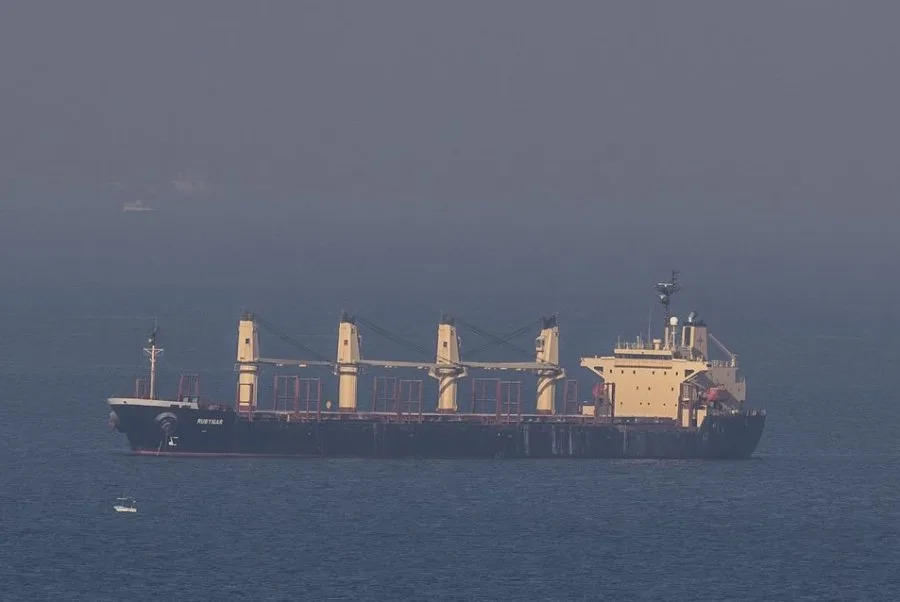
Cargo ship M/V Rubymar, carrying Ukrainian grain, is shown at anchor in the Black Sea in November 2022. The ship sank on Saturday after being crippled by Houthi attacks in February.
March 2 (UPI) -- The British bulk carrier M/V Rubymar, crippled by fire from Houthi rebels last month, sank in international waters in the Red Sea on Saturday, Yemeni government officials announced.
The ship's sinking "will cause an environmental catastrophe" affecting Yemen's territorial waters and the Red Sea, Yemen's ad hoc Crisis Management Cell said in a statement reported by Turkey's Anadolu Agency.
The vessel was carrying 41,000 tons of fertilizer, and its sinking raises worsens what the U.S. Central Command called an environmental disaster caused by the "unprovoked and reckless attack by Iran-backed Houthi terrorists."
The ship was attacked in a missile strike launched by Houthi militants on Feb. 18, which caused a large oil slick and concerns that its cargo of fertilizer would create a catastrophe.
The Rubymar took on water following the attack and was awaiting a tow to the Saudi Arabian port of Jeddah before sinking overnight. Its crew had abandoned the ship following the missile attack.
The Houthi militants are based in Yemen and are targeting cargo ships owned or operated by Israeli firms or that are carrying supplies to or from Israel in the Gulf of Aden and the Red Sea since the onset of the war in Gaza.
Joint strikes by the United States and Britain against Houthi targets recently caused the Houthis to declare all British and U.S. ships to be legitimate targets for military action.
After the Rubymar was attacked, officials in and around the ports of Aden and Djibouti refused to accept it.
Oil spill, fertilizer leak from sinking of cargo ship highlight risks to Red Sea from Houthi attacks
JOSHUA GOODMAN
Sat, March 2, 2024
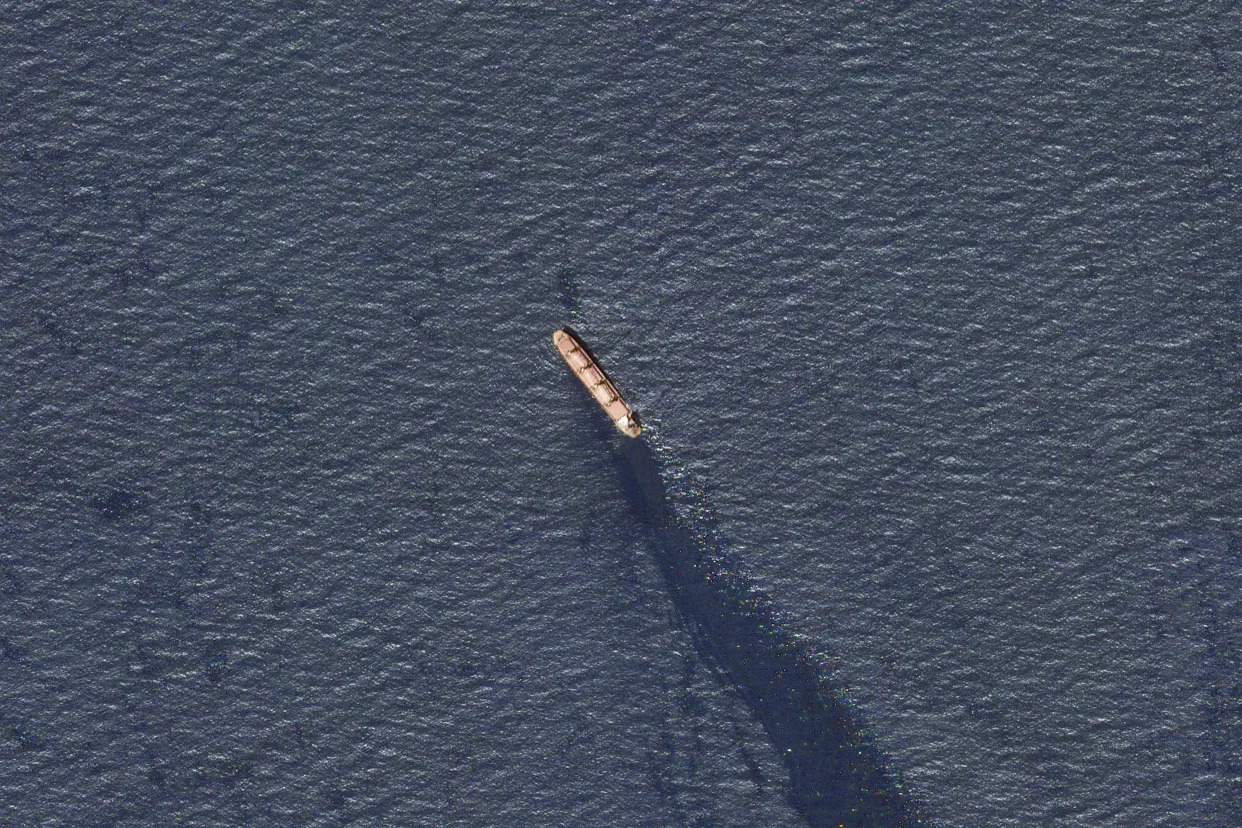
In this satellite image provided by Planet Labs, the Belize-flagged bulk carrier Rubymar is seen in the southern Red Sea near the Bay el-Mandeb Strait leaking oil after an attack by Yemen's Houthi rebels Tuesday, Feb. 20, 2024. Despite a month of U.S.-led airstrikes, Yemen's Iran-backed Houthi rebels remain capable of launching significant attacks. This week, they seriously damaged a ship in a crucial strait and apparently downed an American drone worth tens of millions of dollars. (Planet Labs PBC via AP)More
MIAMI (AP) — A vibrant fishing industry, some of the world’s largest coral reefs, desalination plants supplying millions with drinking water. They're all at risk from large amounts of fertilizer and oil spilled into the Red Sea by the sinking of a cargo ship attacked by Yemen’s Houthi rebels.
Officials on Saturday said the M/V Rubymar, a Belize-flagged vessel reportedly carrying 22,000 metric tons of toxic fertilizer, sunk after taking on water in the Feb. 18 attack.
Even before plunging to the ocean’s depths, the vessel had been leaking heavy fuel that triggered an 18-mile (30 km) oil slick through the waterway, which is critical for cargo and energy shipments heading to Europe.
Since November, the Houthi rebels have repeatedly targeted ships in the Red Sea over Israel’s offensive in Gaza. They have frequently targeted vessels with tenuous or no clear links to Israel.
U.S. Central Command, which oversees the Middle East, has warned in recent days of an “environmental disaster” in the making. That has less to do with the size of the vessel’s hazardous cargo than the unique natural features and usage of the Red Sea, said Ian Ralby, founder of maritime security firm I.R. Consilium.
Aggravating concerns over the Rubymar's sinking is the Red Sea’s unique circular water patterns, which operate essentially as a giant lagoon, with water moving northward, toward the Suez Canal in Egypt, during winter and outward to the Gulf of Aden in summer.
“What spills in the Red Sea, stays in the Red Sea,” said Ralby. “There are many ways it can be harmed.”
Saudi Arabia for decades has been building the world’s largest network of desalination plants, with entire cities like Jeddah relying on the facilities for almost all of their drinking water. Oil can clog intake systems and inflict costly damage on saltwater conversion.
The Red Sea is also a vital source of seafood, especially in Yemen, where fishing was the second largest export after oil before the current civil war between the Houthis and Yemen’s Sunni government.

Ralby has been studying the Red Sea’s vulnerabilities in relation to what could've been a far worse maritime tragedy: the FSO Safer, a decrepit oil tanker that had been moored for years off the coast of Yemen with more than 1 million barrels of crude until its cargo was successfully transferred to another vessel last year.
While the amount of oil the Rubymar leaked is unknown, Ralby estimates it couldn’t have exceeded 7,000 barrels. While that’s a mere fraction of the Safer’s load, it’s significantly more oil than was spilled by a Japanese-owed vessel, the Wakashio, that wrecked near Mauritius in 2020, causing millions of dollars in damages and harming the livelihood of thousands of fishermen.
Harder to grasp is the risk from the 22,000 metric tons of fertilizer that port authorities in Djibouti, adjacent to where the Rubymar sank, said the ship was transporting at the time of the attack. If the Rubymar remains intact underwater, the impact will be a slow trickle instead of a massive release, said Ralby.
Fertilizer fuels the proliferation of algae blooms like the ones seen every year in the Texas Gulf Coast as a result of far larger nutrient runoff from farms, urban lawns and industrial waste. The result is the loss of oxygen, asphyxiation of marine life and the creation of so-called “dead zones.”
At risk in the Red Sea are some of the world’s most colorful and extensive coral reefs. Several are major tourist draws and increasingly a subject of great scientific research owing to their apparent resilience to warming seawater temperatures that have destroyed reefs elsewhere in the ocean.
However manageable the fallout from the Rubymar’s sinking, Ralby worries that it could be a forerunner of even worse to come. He said most of the container ships pulled out from the Red Sea shipping lanes since the Houthis began targeting ships in the area over the Israel-Hamas war. What remains, he said, are poorly maintained vessels, oil tankers and bulk carriers that pose far greater environmental risks.
“With fewer and fewer container ships to target, the odds of another spill with massive environmental impact has increased enormously,” said Ralby.
___
British cargo ship sinks after Houthi attack in Red Sea
Our Foreign Staff
Sat, March 2, 2024
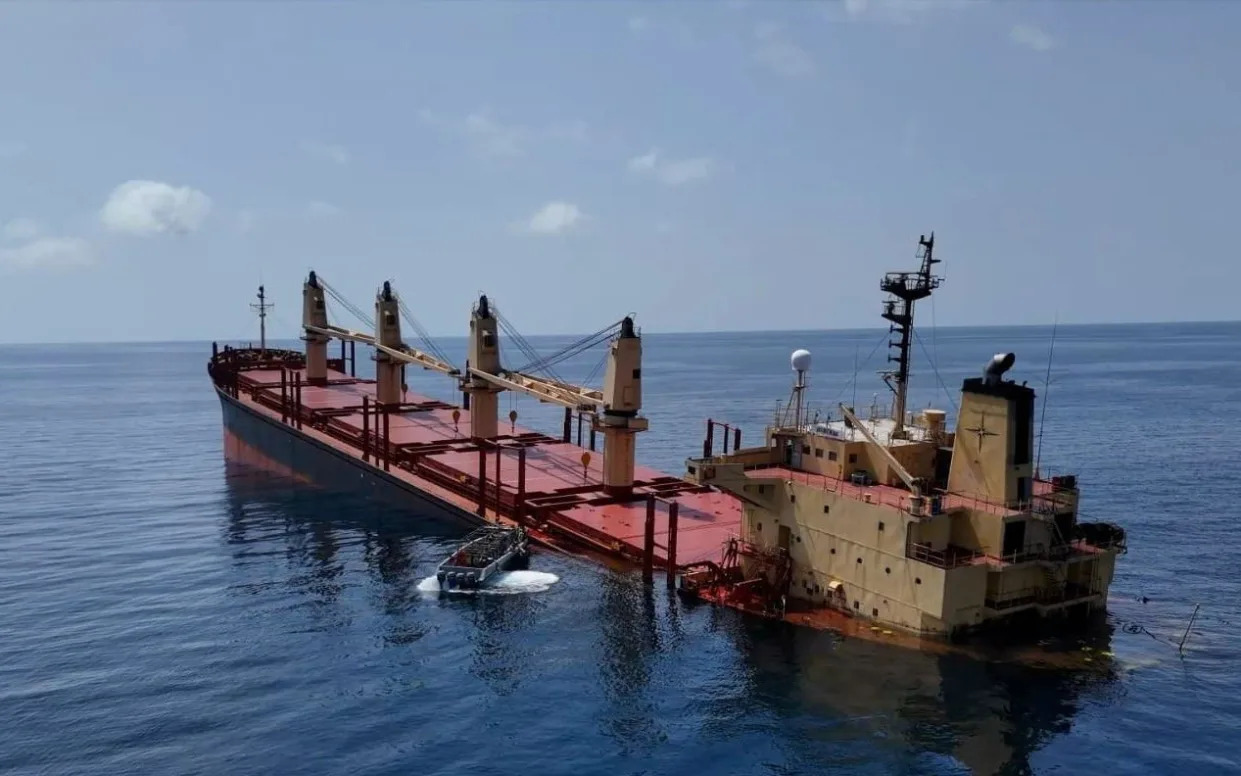
The Rubymar was carrying more than 41,000 tons of fertiliser when it came under attack - Yemeni Al-Joumhouriya TV HANDOUT/EPA-EFE/Shutterstock
A British-owned cargo ship sank in the Red Sea after it was damaged in a Houthi attack last month, Yemen’s government said on Saturday.
The government statement said the Rubymar sank on Friday night and warned of an “environmental catastrophe”.
It is believed to be the first vessel lost since the Iran-backed Houthis began targeting commercial shipping in mid-November.
The ship was carrying more than 41,000 tons of fertiliser when it came under attack, the US military’s Central Command previously said.
Yemen’s Houthi militants have been attacking commercial ships in the Red Sea region, saying they are acting in solidarity with Palestinians in Gaza.
On Monday, a Yemeni government team visited the Rubymar, a Belize-flagged, UK-owned cargo ship, and said it was partially submerged and could sink within a couple of days.
The US military previously said the attack had significantly damaged the freighter and caused an 18-mile oil slick.
The United States Navy’s Fifth Fleet did not immediately respond to a request to confirm the sinking on Saturday.
Houthi attacks have prompted shipping firms to divert vessels on to the longer, more expensive route around southern Africa. They have also stoked fears that the Israel-Hamas war could spread, destabilising the wider Middle East.
The United States and Britain began striking Houthi targets in Yemen in January in retaliation for the attacks on shipping in the Red Sea, Bab al-Mandab Strait and Gulf of Aden.
Yemen’s internationally recognised government is based in the southern port of Aden while the Houthis control much of the north and other large centres.
Ship hit earlier by Yemen's Houthi rebels sinks in Red Sea
Euronews
Sat, March 2, 2024
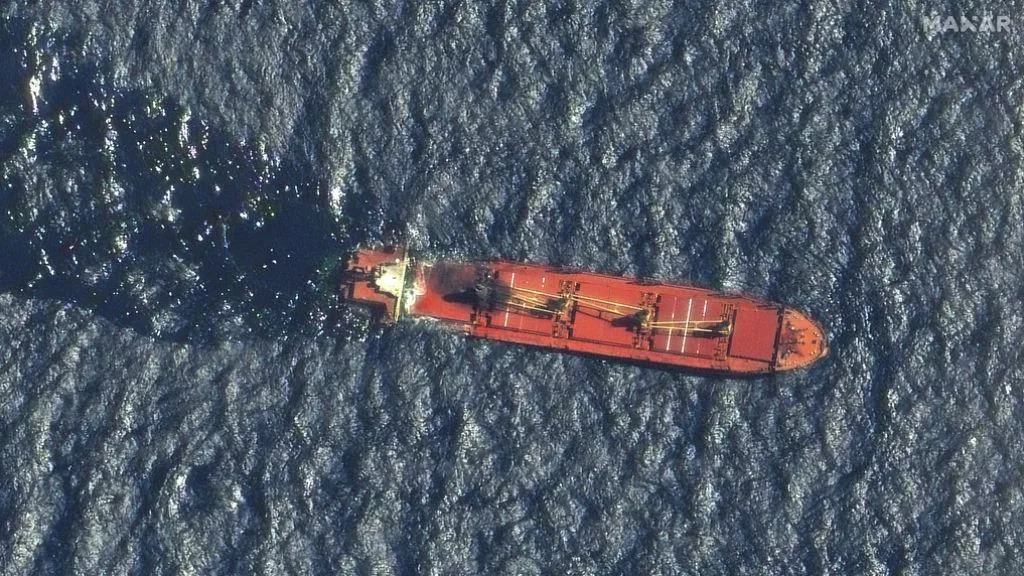
Ship hit earlier by Yemen's Houthi rebels sinks in Red Sea
A ship attacked by Yemen's Houthi rebels has sunk in the Red Sea after days of taking on water, officials said Saturday.
It is the first vessel to be fully destroyed as part of their campaign over Israel's war against Hamas in the Gaza Strip.
The sinking of the Rubymar comes as shipping through the crucial waterway for cargo and energy shipments moving from Asia and the Middle East to Europe has been affected by the Houthi attacks.
Already, many ships have turned away from the route.
The sinking could see further detours and higher insurance rates put on vessels plying the waterway — potentially driving up global inflation and affecting aid shipments to the region.
The Belize-flagged Rubymar had been drifting northward after being struck by a Houthi anti-ship ballistic missile on Feb. 18 in the Bab el-Mandeb Strait, a crucial waterway linking the Red Sea and the Gulf of Aden.
The vessel had been abandoned for 12 days after the attack, though plans had been made to try and tow the ship to a safe port.
The Iran-backed Houthis, who had falsely claimed the ship sank almost instantly after the attack, did not immediately acknowledge the ship's sinking.
The US military’s Central Command previously warned the vessel’s cargo of fertilizer, as well as fuel leaking from the ship, could cause ecological damage to the Red Sea.
The Houthis have held Yemen's capital, Sanaa, since 2014, expelling the government. It fought a Saudi-led coalition since 2015 in a stalemated war.
Since November, the rebels have repeatedly targeted ships in the Red Sea and surrounding waters over the Israel Hamas war.
Despite over a month of US-led airstrikes, Houthi rebels remain capable of launching significant attacks. That includes the attack on the Rubymar and the downing of a US drone worth tens of millions of dollars.
The Houthis insist their attacks will continue until Israel stops its combat operations in the Gaza Strip, which have enraged the wider Arab world and seen the Houthis gain international recognition.
However, there has been a slowdown in attacks in recent days. The reason for that remains unclear.
Ship sunk by Houthis threatens Red Sea environment, Yemen government and US military say
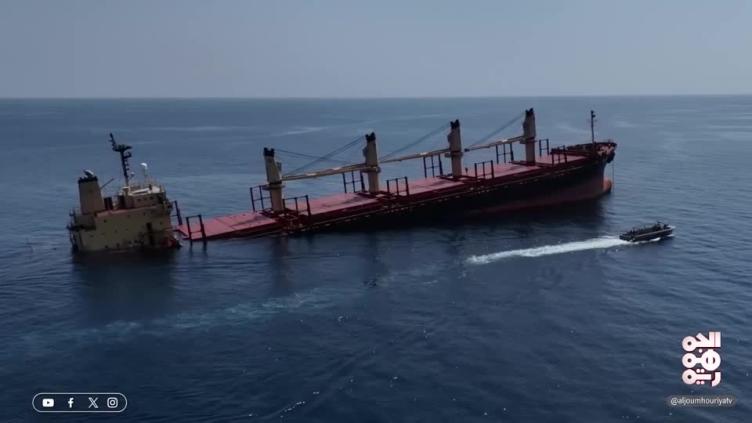
Updated Sat, March 2, 2024
By Mohammad Ghobari
ADEN, Yemen (Reuters) -A UK-owned ship attacked by Houthi militants last month sank in the Red Sea, the U.S. military confirmed on Saturday, as it echoed a warning from Yemen's internationally recognised government that the vessel's cargo of hazardous fertiliser posed a risk to marine life.
The Belize-registered Rubymar is the first vessel lost since the Houthis began targeting commercial ships in November. Those drone and missile assaults have forced shipping firms to divert ships to the longer route around southern Africa, disrupting global trade by delaying deliveries and sending costs higher.
The sinking bulk carrier also "presents a subsurface impact risk to other ships transiting the busy shipping lanes of the waterway," U.S. Central Command (CENTCOM) said in its statement on social media platform X.
The Iran-aligned Houthis, who control the north of Yemen and other large centres, say their campaign is a show of solidarity with Palestinians in Gaza.
The Houthi attacks have prompted a series of strikes against their positions by the United States and Britain, and have led other navies to send vessels to the region to try to protect the vital Suez Canal trade route.
The Rubymar went down in the southern Red Sea late on Friday or early on Saturday, according to statements from the Yemen government and CENTCOM.
The U.S. military previously said the Feb. 18 missile attack had significantly damaged the bulk vessel and caused an 18-mile (29-km) oil slick. The ship was carrying about 21,000 metric tons of fertiliser, CENTCOM said on Saturday.
Ahmed Awad bin Mubarak, the foreign minister in Yemen's internationally recognised government in Aden, said in a post on X: "The sinking of the Rubymar is an environmental catastrophe that Yemen and the region have never experienced before.
"It is a new tragedy for our country and our people. Every day we pay the price for the adventures of the Houthi militia ..."
The internationally recognised government, which is backed by Saudi Arabia, has been at war with the Houthis since 2014.
MARINE LIFE THREATENED
The release of such large amounts of fertiliser into the Red Sea poses a serious threat to marine life, said Ali Al-Sawalmih, director of the Marine Science Station at the University of Jordan.
The overload of nutrients can stimulate excessive growth of algae, using up so much oxygen that regular marine life cannot survive, said Al-Sawalmih, describing a process called eutrophication.
"An urgent plan should be adopted by countries of the Red Sea to establish monitoring agenda of the polluted areas in the Red Sea as well as adopt a cleanup strategy," he said.
The overall impact depends on how ocean currents deplete the fertiliser and how it is released from the stricken vessel, said Xingchen Tony Wang, assistant professor at the Department of Earth and Environmental Sciences at Boston College.
The ecosystem of the southern Red Sea features pristine coral reefs, coastal mangroves and diverse marine life.
Last year, the area avoided a potential environmental disaster when the United Nations removed more than 1 million barrels of oil from a decaying supertanker moored off the Yemen coast. That type of operation may be more difficult in the current circumstances.
The Houthi attacks have stoked fears that the Israel-Hamas war could spread, destabilising the wider Middle East.
In a separate report, the UKMTO agency said it had received a report of a ship being attacked 15 nautical miles west of Yemen's port of Mokha.
"The crew took the vessel to anchor and were evacuated by military authorities," the UKMTO said in an advisory note.
Italy's defence ministry also said that one of its naval ships had shot down a drone flying towards it in the Red Sea.
The Houthi Transport Ministry, meanwhile, said there had been a "glitch" in undersea communication cables in the Red Sea as a result of actions by U.S. and British naval vessels. It did not give further details.
(Reporting by Mohammad Ghobari in Aden, Andrew Mills in Doha, Yomb Ehab in Cairo and Lisa Baertlein in Los Angeles; Writing by Enas Alashray, Andrew Mills and Mark Potter; Editing by Alison Williams, Giles Elgood and Jamie Freed)
A ship earlier hit by Yemen's Houthi rebels sinks in the Red Sea, the first vessel lost in conflict
JON GAMBRELL
Updated Sat, March 2, 2024
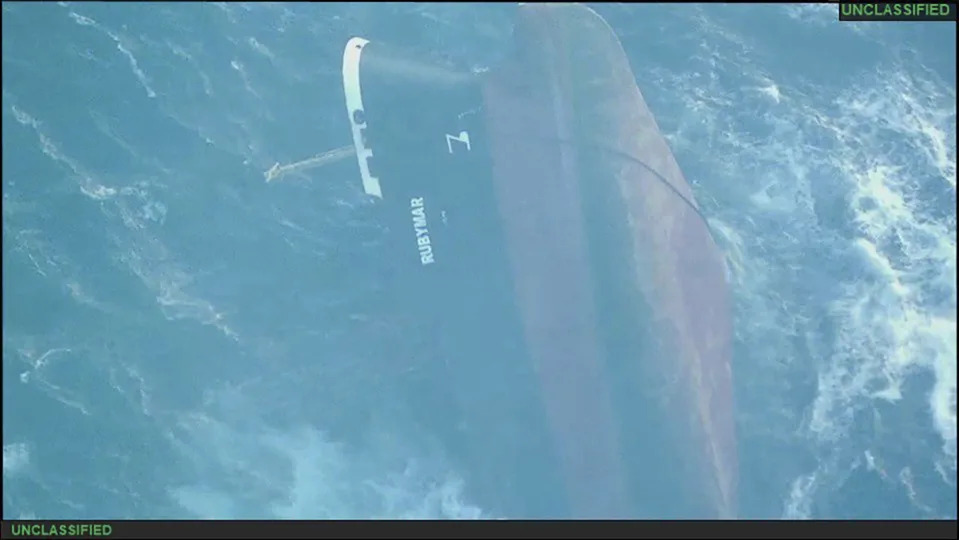
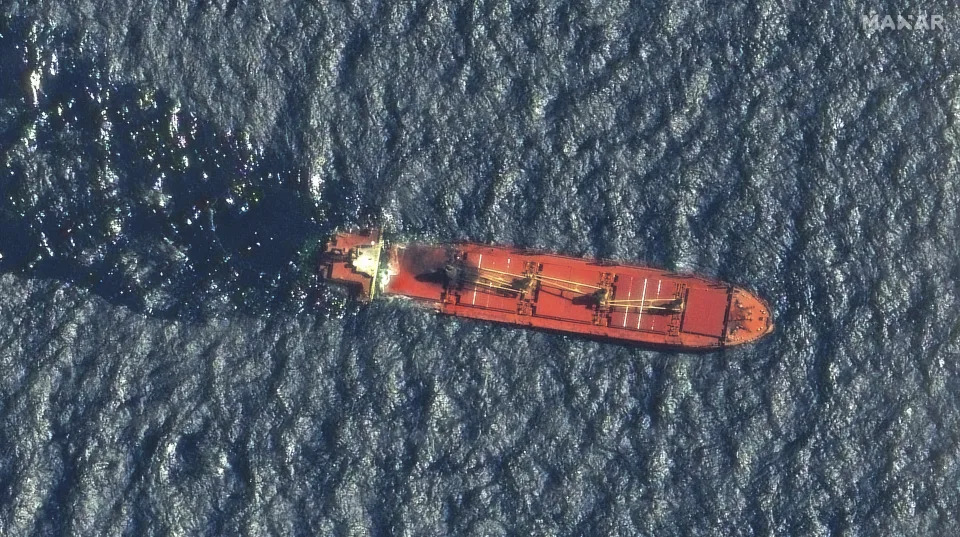
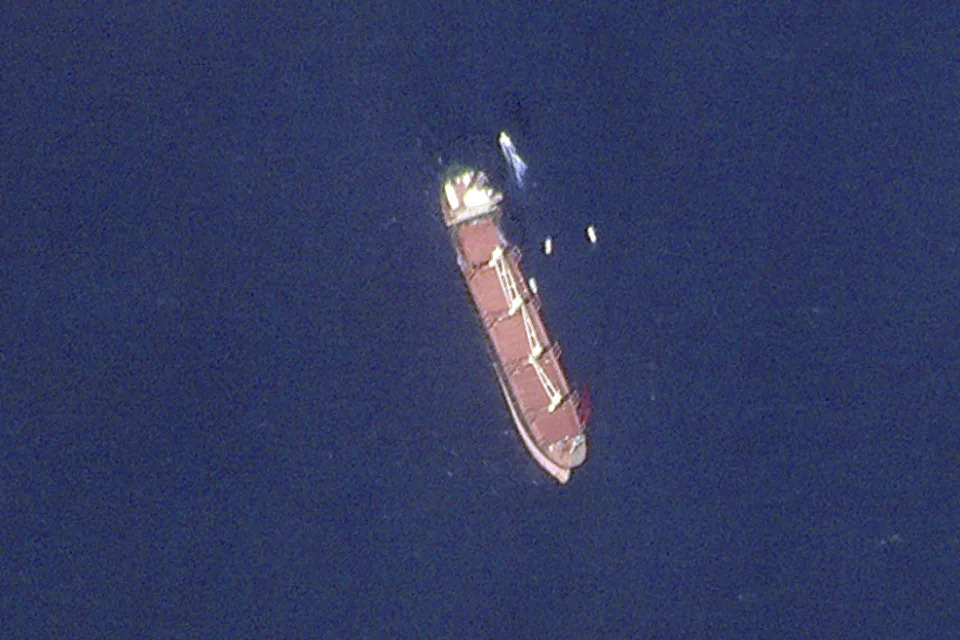
This satellite image taken by Planet Labs PBC shows the Belize-flagged ship Rubymar in the Red Sea on Wednesday, Feb. 28, 2024. The Rubymar, earlier attacked by Yemen's Houthi rebels, has sunk in the Red Sea after days of taking on water, officials said Saturday, March 2, 2024, the first vessel to be fully destroyed as part of their campaign over Israel's war against Hamas in the Gaza Strip.
DUBAI, United Arab Emirates (AP) — A ship attacked by Yemen's Houthi rebels has sunk in the Red Sea after days of taking on water, officials said Saturday, the first vessel to be fully destroyed as part of their campaign over Israel's war against Hamas in the Gaza Strip.
The sinking of the Rubymar, which carried a cargo of fertilizer and previously leaked fuel, could cause ecological damage to the Red Sea and its coral reefs.
Persistent Houthi attacks have already disrupted traffic in the crucial waterway for cargo and energy shipments moving from Asia and the Middle East to Europe. Already, many ships have turned away from the route.
The sinking could see further detours and higher insurance rates put on vessels plying the waterway — potentially driving up global inflation and affecting aid shipments to the region.
The Belize-flagged Rubymar had been drifting northward after being struck by a Houthi anti-ship ballistic missile on Feb. 18 in the Bab el-Mandeb Strait, a crucial waterway linking the Red Sea and the Gulf of Aden.
Yemen's internationally recognized government, as well as a regional military official, confirmed the ship sank. The official spoke on condition of anonymity as no authorization was given to speak to journalists about the incident.
The British military's United Kingdom Maritime Trade Operations center, which watches over Mideast waterways, separately acknowledged the Rubymar's sinking Saturday afternoon.
The U.S. military's Central Command said early Sunday the Rubymar sank at 2:15 a.m. local time Saturday. It released an image of the vessel on its side as it was sinking.
“The approximately 21,000 metric tons of ammonium phosphate sulfate fertilizer that the vessel was carrying presents an environmental risk in the Red Sea,” it said in a statement. “As the ship sinks it also presents a subsurface impact risk to other ships transiting the busy shipping lanes of the waterway.”
The Rubymar’s Beirut-based manager did not respond to a request for comment.
Yemen's exiled government, which has been backed by a Saudi-led coalition since 2015, said the Rubymar sank as stormy weather took hold over the Red Sea. The vessel had been abandoned for 12 days after the attack, though plans had been made to try and tow the ship to a safe port.
The Iran-backed Houthis had falsely claimed the ship sank almost instantly after the initial attack. Late Saturday, a Houthi leader tried to blame British Prime Minister Rishi Sunak over the Rubymar.
“You have an opportunity to salvage the ship M/V Rubymar by guaranteeing ... that the relief trucks agreed upon at that time would enter Gaza,” Mohammed al-Houthi wrote in an online message.
Ahmed Awad Bin Mubarak, the prime minister of Yemen's internationally recognized government, called the ship's sinking “an unprecedented environmental disaster.”
“It’s a new disaster for our country and our people,” he wrote on X, formerly Twitter. “Every day, we pay for the Houthi militia’s adventures, which were not stopped at plunging Yemen into the coup disaster and war.”
Greenpeace also raised concerns about the ship sinking.
“Without immediate action, this situation could escalate into a major environmental crisis,” said Julien Jreissati, program director at Greenpeace MENA.
“As well as any further leaks of fuel oil from the engines, the sinking of the vessel could further breach the hull, allowing water to contact with the thousands of tons of fertilizer, which could then be released into the Red Sea and disrupt the balance of the marine ecosystems, triggering cascading effects throughout the food web.”
The Houthis have held Yemen's capital, Sanaa, since 2014, expelling the government. The rebels have fought a Saudi-led coalition since 2015 in a stalemated war.
Satellite pictures analyzed by The Associated Press from Planet Labs PBC showed smaller boats alongside the Rubymar on Wednesday. It wasn't immediately clear whose vessels those were. The images showed the Rubymar's stern sinking into the Red Sea but still afloat, mirroring earlier video taken of the vessel.
The private security firm Ambrey separately reported Friday about a mysterious incident involving the Rubymar.
“A number of Yemenis were reportedly harmed during a security incident which took place” on Friday, Ambrey said. It did not elaborate on what that incident involved and no party involved in Yemen's yearslong war claimed any new attack on the vessel.
A satellite image taken Friday from Maxar Technologies showed new blast damage on the Rubymar not previously seen, with no other vessels around it. Additional satellite images taken Saturday by Planet Labs PBC of the area the Rubymar had been in recent days no longer showed the vessel.
Since November, the rebels have repeatedly targeted ships in the Red Sea and surrounding waters over the Israel-Hamas war. Those vessels have included at least one with cargo bound for Iran, the Houthis’ main benefactor, and an aid ship later bound for Houthi-controlled territory.
Despite over a month of U.S.-led airstrikes, Houthi rebels have remained capable of launching significant attacks. That includes the attack on the Rubymar and the downing of an American drone worth tens of millions of dollars. The Houthis insist their attacks will continue until Israel stops its combat operations in the Gaza Strip, which have enraged the wider Arab world and seen the Houthis gain international recognition.
The attacks have also disrupted aid shipments to both Yemen and Sudan, which is gripped by its own monthslong war. In recent days, the International Rescue Committee said it suspended its aid shipments to Port Sudan through the Red Sea over long delays and drastically increased costs.
However, there has been a slowdown in attacks in recent days. The reason for that remains unclear. Between four to eight U.S. and allied warships now patrol the Red Sea on any given day, said Maj. Pete Nguyen, a Defense Department spokesperson.
On Saturday, the Italian Defense Ministry said one of its vessels, the destroyer Caio Duilio, shot down a suspected Houthi drone in self-defense that appeared to be flying toward it.
"The terrorist attacks by the Houthis are a serious violation of international law and an attack on the safety of maritime traffic, on which our economy depends," the ministry said.
___
Associated Press writer Samy Magdy in Cairo contributed to this report.
Only grain ships from Black Sea and for Iran still crossing Red Sea, analysts say
Reuters
Fri, March 1, 2024
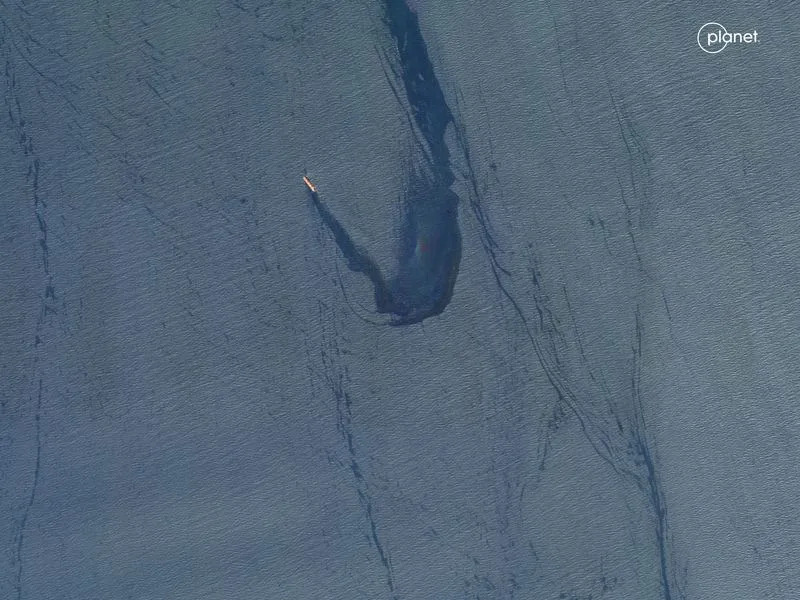
Satellite image shows cargo ship Rubymar, attacked by Yemen's Houthis, according to U.S. military, on the Red Sea
HAMBURG (Reuters) - Grain ships originating from the Black Sea or bound for Iran are about the only ones still sailing through the Red Sea as Houthi militants continue to attack vessels in the area, analysts said on Friday.
The attacks by the Iran-aligned Houthis have disrupted global shipping since November and forced firms to re-route to longer and more expensive journeys around southern Africa.
"Just about all (dry bulk grain) vessels going from the Americas and western Europe are avoiding the Red Sea, the only exception is vessels going to Iran, they're still taking the Red Sea route when shorter," said Ishan Bhanu, lead agricultural commodities analyst at data provider and analysts Kpler.
"All vessels we are tracking going from the Black Sea to Asia are going through the Red Sea, almost without exception," he added.
Grain transit through the Suez Canal hit a low of 2.6 million metric tons in February, down from 5.3 million tons in February 2023, Bhanu estimated.
The United States and other countries have sent naval vessels to protect civilian ships while the U.S. and UK have launched air strikes against Houthi forces, who say they are acting in solidarity with Palestinians against Israel's military actions in Gaza.
"The Red Sea naval operation and air strikes have been going on for weeks now and it is pretty obvious that the Houthi attacks cannot be stopped easily by military means or that commercial ships can be given blanket protection," said one grain trader booking vessels to export cargoes from Europe.
"Many ship owners are still willing to accept the danger to their ships and vessels still can be booked for Red Sea sailings. Chinese purchases of Ukrainian corn recently are expected to transit the Red Sea."
(Reporting by Michael Hogan, editing by Kirsten Donovan)
No comments:
Post a Comment